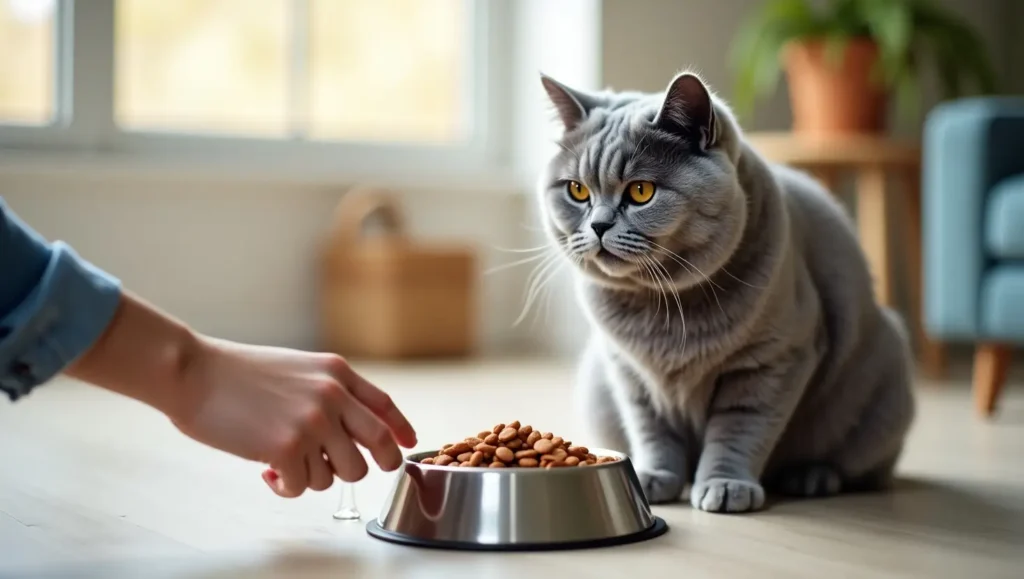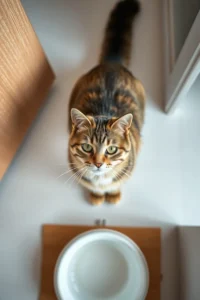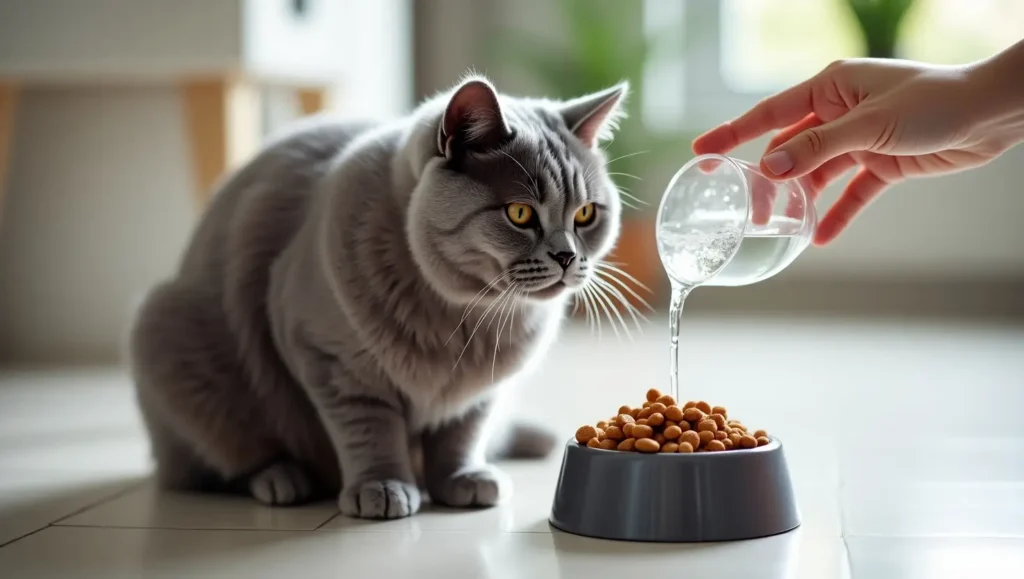When it comes to appropriate feeding for British Shorthair cats, pet owners often struggle to find the right balance between nutrition and portion control. At Whizpet, we’ve dedicated extensive research to uncover the best feeding practices tailored specifically for this beloved breed. Our team has analyzed veterinary insights, pet nutrition studies, and real-life feeding experiences to bring you a well-rounded and practical guide.
British Shorthair cats have unique dietary needs due to their sturdy build, slow metabolism, and predisposition to weight gain. Understanding appropriate feeding for British Shorthair cats is key to preventing health issues like obesity, urinary problems, and digestive discomfort. Our research highlights the best feeding routines, high-quality food choices, and expert-backed nutritional recommendations to help your cat live a long, healthy life.
If you’re looking for an easy-to-follow, research-backed approach to appropriate feeding for British Shorthair cats, this guide will provide everything you need. From the best diet choices to portion control and hydration strategies, we’ll walk you through every essential aspect of feeding your feline friend the right way.

Why Is Appropriate Feeding for British Shorthair Cats Important?
British Shorthairs are prone to obesity, urinary tract issues, and digestive sensitivities. Their stocky build and lower activity levels make them more susceptible to weight gain, which can lead to diabetes, joint problems, and heart disease. Providing appropriate feeding for British Shorthair cat ensures they receive the right balance of protein, fats, and fiber to maintain an ideal body condition.
A well-structured diet can:
- Maintain a healthy weight and prevent obesity-related diseases
- Support strong bones and muscles for better mobility
- Promote a glossy coat and healthy skin through essential fatty acids
- Improve digestion and gut health by including fiber-rich, digestible ingredients
- Reduce the risk of kidney and bladder diseases by ensuring proper hydration and high-quality protein intake
Additionally, feeding schedules and portion control are crucial. Overfeeding or providing excessive treats can disrupt their metabolism, leading to long-term health concerns. By following a British Shorthair feeding guide, you can ensure your cat stays energetic and lives a longer, healthier life. Understanding appropriate feeding for British Shorthair cat is the first step toward responsible pet care and overall feline well-being.
5 Expert Tips for Appropriate Feeding for British Shorthair Cats
1. Choose High-Quality Protein-Based Food for Appropriate Feeding for British Shorthair Cats
Providing appropriate feeding for British Shorthair cat starts with selecting a high-quality, protein-rich diet. Since these cats have a naturally muscular build, they require premium animal protein sources to maintain their strength, support healthy organ function, and sustain energy levels.
Look for foods that contain:
- Real meat as the first ingredient (chicken, turkey, salmon, or lamb)
- Essential amino acids like taurine to support heart and eye health
- Healthy fats like Omega-3 and Omega-6 for skin and coat health
- Limited carbohydrates to prevent unnecessary weight gain
Best Food for British Shorthair Kitten
Kittens require more calories and proteins for proper growth and development. Choosing the right diet ensures a strong immune system, proper brain function, and muscle formation. For appropriate feeding for British Shorthair cat, consider these top-rated kitten foods:
- Royal Canin British Shorthair Kitten Dry Food – Specially formulated for their unique jaw structure and nutritional needs
- Blue Buffalo Wilderness High Protein Kitten Food – Grain-free and packed with real meat proteins
- Hill’s Science Diet Kitten Food – Contains DHA for brain development and strong bones
Additionally, ensure your cat’s diet includes moisture-rich foods to support kidney function and reduce the risk of urinary tract infections. Mixing wet food with dry kibble provides variety and optimal nutrition for a well-balanced diet.
2. Follow a Proper Feeding Schedule for Appropriate Feeding for British Shorthair Cats
Maintaining a structured feeding schedule is a crucial part of appropriate feeding for British Shorthair cat. These cats have a slower metabolism and a natural tendency to gain weight, making portion control and meal timing essential for their overall health. Feeding your British Shorthair at the same time every day helps regulate digestion, prevent overeating, and ensure they receive balanced nutrition without unnecessary calorie intake.
How Much Should I Feed My British Shorthair Kitten?
Kittens require frequent meals to support their rapid growth and high energy levels:
- 8-12 weeks: 4 small meals per day
- 3-6 months: 3 meals per day
- 6+ months: 2 meals per day
Feeding Guide for Adult British Shorthairs
As they mature, British Shorthairs should transition to a well-portioned adult feeding routine:
- Dry Food: ¼ – ½ cup per meal
- Wet Food: One 3 oz can per meal
For appropriate feeding for British Shorthair cat, avoid free-feeding, as unrestricted access to food can lead to obesity. Instead, use portioned meals based on age, activity level, and weight. Consider using puzzle feeders or slow-feed bowls to make mealtimes engaging while preventing rapid eating.
Hydration is also key—ensure your cat has access to fresh water at all times, especially if feeding primarily dry kibble. This structured approach to feeding will keep your British Shorthair healthy, active, and at an ideal weight.
3. Wet vs. Dry Food: What’s Best for Appropriate Feeding for British Shorthair Cats?
Choosing between wet and dry food plays a significant role in appropriate feeding for British Shorthair cat. Each type of food has unique benefits, and a combination of both can provide a balanced diet that supports hydration, dental health, and overall well-being.
Best Wet Food for British Shorthair Kitten
Wet food is highly recommended for British Shorthair kittens as it provides necessary hydration and supports kidney and urinary tract health. It is also easier to digest, making it ideal for young cats with developing stomachs. Some top choices include:
- Wellness CORE Grain-Free Canned Kitten Food – High in protein and moisture to support growth
- Tiki Cat Puka Puka Luau Grain-Free Wet Food – Made with real chicken for optimal nutrition
- Instinct Original Grain-Free Pâté – Packed with essential vitamins and minerals
Dry Food Benefits
Dry food is an excellent choice for appropriate feeding for British Shorthair cat, as it helps maintain dental health by reducing plaque buildup. The crunchy texture promotes chewing, which can prevent tartar accumulation. When selecting dry food, opt for high-protein, grain-free formulas with added fiber for digestion, such as:
- Royal Canin British Shorthair Dry Food – Specially designed kibble for their broad jaws
- Blue Buffalo Wilderness High Protein Dry Cat Food – Rich in real meat protein
- Hill’s Science Diet Adult Indoor Cat Food – Formulated for weight and hairball control
For optimal health, consider feeding a mix of wet and dry food to balance hydration and dental benefits. A ratio of 70% wet food and 30% dry kibble works well for most British Shorthairs, ensuring they receive the right nutrients while staying hydrated.
4. Consider Homemade Food for British Shorthair Cats
Many cat owners prefer homemade meals to have complete control over ingredients, ensuring quality and freshness. However, appropriate feeding for British Shorthair cat requires careful meal planning to meet all essential nutritional needs. A well-balanced homemade diet should include:
- Lean proteins (boiled chicken, turkey, or fish) to support muscle health
- Cooked vegetables (pumpkin, carrots, or green beans) for fiber and digestion
- Limited carbohydrates (brown rice or sweet potatoes) to provide slow-releasing energy
When preparing homemade meals, it’s crucial to include essential nutrients such as taurine, which is vital for heart and vision health. Additionally, always avoid toxic foods like onions, garlic, grapes, and chocolate, as they can be harmful. Consulting with a veterinarian or feline nutritionist can help ensure appropriate feeding for British Shorthair cat when choosing a homemade diet.
5. Hydration is Key for Appropriate Feeding for British Shorthair Cats
Proper hydration plays a crucial role in appropriate feeding for British Shorthair cat, as this breed is prone to kidney disease and urinary tract infections. Ensuring your cat drinks enough water can help prevent these health issues while supporting overall digestion and metabolism.
To keep your British Shorthair hydrated:
- Provide fresh, clean water daily in multiple bowls around the house
- Add wet food to their diet to boost moisture intake.
- Use a cat water fountain, as running water encourages cats to drink more
- Add water or broth to dry kibble to enhance hydration
Dehydration can lead to severe health concerns, so monitoring your cat’s water intake is essential. Since British Shorthairs naturally have a low thirst drive, combining wet food with a fresh water source is the best approach for appropriate feeding for British Shorthair cat and long-term health.
British Shorthair Feeding Guide by Age
Feeding your British Shorthair according to age-specific nutritional needs is essential for their growth, weight management, and overall health. Younger kittens require frequent meals packed with high-quality protein and essential nutrients, while adult cats need portion control to prevent obesity. Below is a structured guide for feeding at different life stages:
| Age | Meals Per Day | Wet Food (oz) | Dry Food (Cups) |
| 8-12 weeks | 4 | 3-4 | ¼ – ½ |
| 3-6 months | 3 | 4-5 | ½ – ¾ |
| 6-12 months | 2-3 | 5-6 | ¾ – 1 |
| Adult (1+ yr) | 2 | 6-8 | ½ – 1 |
Following this feeding guide ensures appropriate feeding for British Shorthair cat, promoting optimal growth, energy levels, and long-term health. Always adjust portions based on your cat’s activity level and weight to maintain a healthy balance.

Frequently Asked Questions About Appropriate Feeding for British Shorthair Cats
1. What to feed British Shorthair kittens for optimal growth?
Kittens should be given a high-protein, calorie-dense diet with DHA for brain development. Choose premium kitten food brands.
2. Can British Shorthairs eat human food?
Some human foods like boiled chicken, fish, and pumpkin are safe. However, avoid processed, salty, or toxic foods like onions, grapes, and dairy.
3. How do I prevent obesity in my British Shorthair?
Control portion sizes, follow a feeding schedule, and encourage regular exercise with interactive toys.
4. Is raw food safe for British Shorthair cats?
Raw diets can be beneficial but require careful preparation to balance nutrients and avoid bacterial contamination.
5. How often should I change my cat’s diet?
Changes should be gradual over 7-10 days to prevent digestive upset. If switching brands, mix old and new food in increasing proportions.
Final Thoughts on Appropriate Feeding for British Shorthair Cats
Appropriate feeding for British Shorthair cats plays a crucial role in their overall health and longevity. By choosing high-quality food, maintaining a feeding schedule, and ensuring proper hydration, you can help your furry friend thrive.
Ready to give your British Shorthair the best nutrition? Explore top-rated cat foods and feeding guides to keep your feline happy and healthy!
Related blog: For more detailed information about pet care

